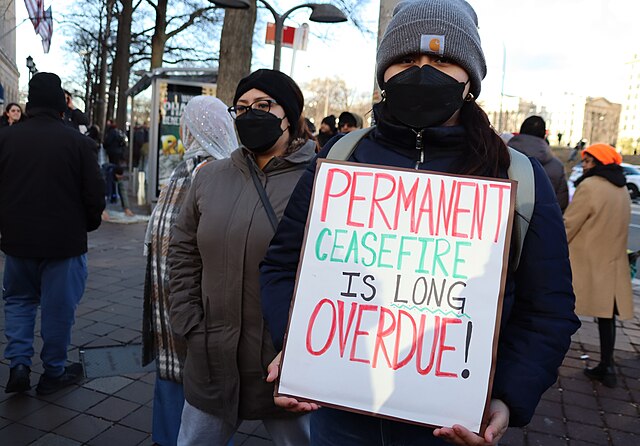De-escalation Starts with a Ceasefire in Gaza

By: Ghassan Rubeiz / Arab America Contributing Writer
Introduction
Over the past weekend the US and its allies retaliated against Iran-backed fighters in Iraq, Syria and Yemen. Since October 7 resistance groups in these three Arab countries have repeatedly (160 times) attacked US troops in Iraq and Syria. The January 28 drone attack on American troops in north Jordan killed three soldiers and wounded dozens. In response to the militia attacks, two consecutive US attacks hit 85 targets in Syria and Iraq, and 35 targets in Yemen on February 2. And 3. So far, the damage caused on either side has been absorbed with restraint. Neither Iran nor the US wishes this secondary conflict to get out of hand.
Gaza in the background
Looming in the background of this new theater of tit-for-tat, asymmetrical war – between a superpower and stateless forces- is the ongoing bloody war in Gaza. The events of the past two weekends have drawn the US into a side conflict which President Biden is trying to make as short as possible.
Ceasefire critical now
Biden is well aware that the US must not be distracted from ending the war in Gaza. A ceasefire in Gaza would provide the opportunity to quiet the Houthis of Yemen; the resistance groups in Iraq and Syria; and Lebanon’s Hezbollah. Ending hostilities in Gaza would allow the release of Israel’s hostages and Palestinian prisoners and open the discussion on the future of Gaza and the wider question of a Palestinian state.
US presence in Iraq and Syria could become a hot topic
If the US retaliation to the January 28 attack on American troops in Jordan does not end soon, it is likely to shift the political discussion from the suffering in Gaza to a completely different but equally thorny subject: American military presence in the region.
Support of the people to the axis of resistance
To avoid another quagmire, beyond Gaza, the US must pay attention to who these militants are and why they have the resilience to confront Washington. These militant or terror groups are relatively popular movements which have gained the respect of large sectors of Arab societies. It is not necessarily what they dream of that makes them popular; their appeal is related to what they oppose: injustice. To be fair, these groups tend to be ideologically narrow and autocratic. With the passage of time they could deviate from their original raison d’etre.
It is not only Iran which supports these resistance groups. Hezbollah gained its popularity locally and regionally in the year 2000, when it drove Israel’s occupying army out of south Lebanon. Similarly, the militias in Iraq and Syria are popular for their role in defeating ISIS, albeit with the support of the US and its allies. The resilience of Hamas in the ongoing war in Gaza has transformed this movement into a leading political force among Palestinians. Through the Yemen war, which started in 2015, the Houthis have gained a reputation of being invincible. These “liberation” groups are appreciated locally and regionally for their opposition to invaders, oppressors and presence of foreign troops. These agents of resistance contrast with heads of states who adapt too easily to corruption and injustice.
Houthis are engaged in peace making with the Saudis
It is not only Gaza the US must focus on now. Yemen’s future is as important as Gaza’s. In attempting to discipline the Houthis the US is delaying the Saudis efforts to make peace in Yemen. For over a year Crown Prince Mohammad bin Salman has been negotiating an agreement with the Houthis and their opponents in Yemen. Yemen’s humanitarian situation is as bad as Gaza’s. The sooner the current US campaign to “teach the Houthis a lesson” ends, the better the chances for peace in the poorest Arab country (nytimes).
Iraqis could ask the US troops to leave their country
The Iraqi government has already started talks with Washington about the future of its troops in Iraq. If this side conflict with the militias of Iraq and Syria results in the withdrawal of American troops, the issue of American military presence in the region would soon emerge for hot debate. A domino effect may result, starting from Iraq and moving to other Arab countries which voluntarily endure American occupation.
The US presence in the Arab world
There are some thirty to forty thousand US troops in the Arab world. They are in Bahrain; Qatar; Saudi Arabia; the United Arab Emirates; Kuwait; Jordan; Syria and Iraq. Qatar hosts the largest air base in the region. Bahrain hosts the US Navy Fifth Fleet. The troops are deployed for a variety of purposes ranging from “assuring stability and security” in the Gulf to defending regimes against the remnants of the Islamic State (ISIS), to military training across the region. The most important function is the provision of security for oil-rich states. Such states have small populations and little experience in warfare. Arabs are generally suspicious of this foreign military presence. However, many of the political leaders in this region depend on the US for protecting their regimes against internal and external threats (Reuters).
US foreign policy inconsistent with military presence
It is clear for most Arabs that the presence of so many troops in the Arab world is not serving the interests of the region. The “security” that US troops are supposed to offer is largely serving Israel and other unpopular or insecure regimes in the region. America’s image in the Arab world is negative today; it has not been the case before. Many in the region question how Arabs can host a military which for decades has been unconditionally supporting the occupation of Arab land in Palestine, Syria and Lebanon.
Iran’s interests must not be ignored
The US Secretary of State is currently on his fifth visit to the Middle East since the war in Gaza started. Anthony Blinken is very interested in normalizing relations between Saudi Arabia and Israel. His plan includes the freeing of hostages, the rebuilding of Gaza and the provisions of real statehood for Palestinians (AP News).
Assuming that Israel is currently ready to discuss a Palestinian state, there is the additional assumption that peace is even possible if Iran, Syria, Yemen, Lebanon and Iraq are left outside the equation. Tunisia and Algeria, whose people are alert to sectarian dynamics, may not accept normalization with Israel. These two states may see normalization as splitting the Arab world into a Sunnite coalition, co-opted by a Jewish state, to confront a coalition of Shiite states: the “axis of evil”, to use an expression coined by George W Bush before his invasion of Iraq. The only way to bring peace to the region is to find a constructive role for Iran in a new political regional landscape. President Obama understood this inclusive logic in foreign policy, but Tel-Aviv has pushed Washington to mobilize against Iran in the search for peace.
It takes political maturity to piece together a formula of ending the war in Gaza, freeing hostages and prisoners, responding to the long neglected Palestinian aspirations and restoring security to Israel. But without considering Iran’s interests, the spoilers of peace would be active and effective.
It would be naïve to assume that once Mohammad bin Salman is ready to sign a regional peace agreement, the rest of the Arab states will automatically follow in his steps. More importantly, for peace to last, it will need to be supported by the majority of the people, not simply echoing the voice of a weak Arab League. The separate peace agreements which have been signed by the six Arab countries (Egypt, Jordan, the UAE, Bahrain, Morocco and Sudan) and Israel remain as symbolic, paper documents in need of validation by the people. For peace to last and deepen, the Arab street must be convinced that cooperation with Israel is necessary for their future.
To de-escalate the growing tension in the region, Biden has to start with arranging a ceasefire in Gaza. He then can invite all stakeholders in the region to the negotiation table. A historic Middle East peace conference may be due at some point in the future.
Check Arab America’s blog here!



